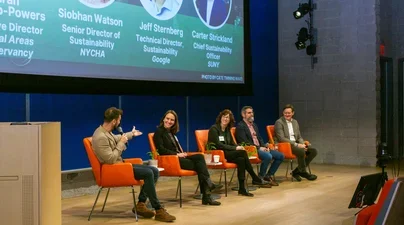By Canute Haroldson, Co-chair of Columbia’s 2024 Sustainability Symposium
On a mild Friday in March, just off the 125th subway stop, students and professionals poured into The Forum to attend Columbia’s Sustainability Symposium. With more than 365 attendees, the excitement in the air was palpable.
The Sustainability Symposium is a fully student-run event put on every spring by the Sustainability Management Student Association at Columbia University School of Professional Studies (SPS). Once a half-day set of panels, this year’s symposium was the largest to date, with record numbers of attendees and speakers, a full day of programming, public access to the event, the first-ever sustainable fashion panel, and even vegetarian catering.
Neeradha Ravikumar and I served as the co-chairs for this year’s Symposium, which we started planning in the summer of 2023. We had a common reason for working on the Symposium. Often discussions around sustainability are either soured by false solutions to the climate crisis or are focused only on describing the issues. Neera and I wanted to create an event fully focused on the solutions and actions that drive real change. We ran a survey to learn exactly what Sustainability Management students wanted to learn about at a symposium, and started designing.
Discussions on real change were exactly what we got.
Sweeping across industries, the Symposium touched on many of the core issues of sustainability facing the U.S. today. Implementing funds from the Inflation Reduction Act (IRA), considering the implications of the SEC climate ruling, how supply chains affect equitable access for all people, and how the principles of climate justice are present in all aspects of sustainable design were just a few of the topics covered.

On each panel, we balanced out opinions and experience across a number of areas. From academics to industry professionals, small-scale businesses to multinational corporations, our speaker selection was designed to bring a wealth of different perspectives to every panel session.
While sustainability conversations can quickly become politically or emotionally challenging, our speakers didn’t shy away from bringing up difficult topics. Our Revolutionizing Resources panel hammered home the idea that recycling cannot be the solution to waste. Founders of the top sustainability job boards in the U.S. reminded us all that electricians are currently among the most in-demand workers. And almost every panel recognized the need for equitable access to finance to enable sustainable development that benefits all people.
Every panel brought something new and exciting to the discussion. For those who weren’t able to attend the event, SUMASA will be adding videos of most panels to their website in May 2024.
At a reception following the panel discussions, the Symposium was a full roar of conversation. Attendees eagerly discussed what they had learned that day, or which of the fiery panelists on the circular economy session was their favorite.
Exhausted and proud, there was one question that Neera and I heard more than any other from students and faculty alike. “Are you doing it again next year?”
Views and opinions expressed here are those of the authors, and do not necessarily reflect the official position of Columbia School of Professional Studies or Columbia University.
About SUMASA
The Sustainability Management Student Association (SUMASA) is a student organization elected to represent the student body of the Columbia University M.S. in Sustainability Management program.